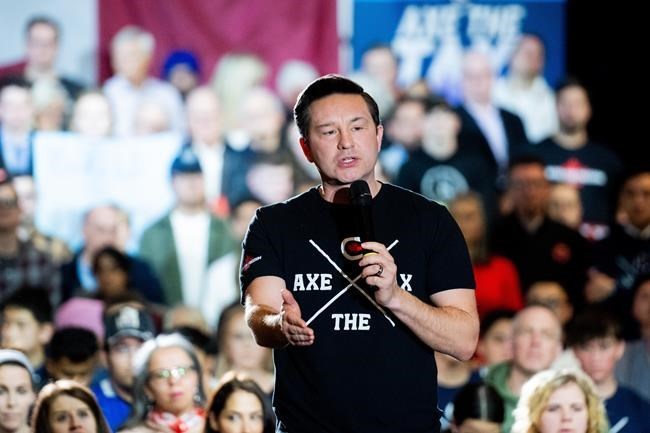OTTAWA — Conservatives won't be taking advice from "so-called experts" when it comes to carbon pricing, the party said in a statement Wednesday after more than 200 economists signed an open letter challenging leader Pierre Poilievre's stance.
Instead, the party is pledging to listen to the "common sense of the common people."
"Common sense Conservatives will listen the common sense of the common people, not Justin Trudeau's so-called 'experts,'" Sebastian Skamski, a spokesperson for Poilievre, said in a statement Wednesday.
The comments come after economists associated with universities across Canada took aim at common claims in the heated debate over the Liberal's carbon price policy.
The economists pushed back on assertions the carbon price has driven up the cost of living, and called out opponents for failing to pitch a less costly alternative to reduce emissions.
"And they certainly aren't offering any alternatives that would reduce emissions at the same low cost as carbon pricing," read the open letter, which had garnered 213 signatures as of Wednesday afternoon.
The Opposition Conservatives have been almost singularly focused on abolishing the carbon price in the lead-up to the scheduled increase to the levy — from $65 to $80 per tonne — on April 1.
In response to the letter, Tories say "experts" are living comfortably while forcing a 23 per cent carbon tax hike on Canadians already struggling with affordability.
Poilievre has hosted massive rallies across the country dedicated to his "axe the tax" and, more recently, "spike the hike" messages.
The Conservatives will "not stop fighting" until Trudeau and NDP and Liberal MPs "spike the hike for all Canadians," Skamski said in a statement.
He did not respond to a request for an interview.
The debate over the policy reached a fever pitch last week as several premiers joined the Conservatives' call to roll back the planned increase to the carbon levy.
Saskatchewan Premier Scott Moe questioned the credibility of the economists who signed the letter Wednesday and dismissed their assertion that the carbon price was the least costly option.
"It's not the least costly way in Saskatchewan," the premier said during testimony at the House of Commons operations committee.
Moe claimed that some of the economists who signed the letter were appointed by the Liberal government to the Ecofiscal Commission in 2016.
In fact, the commission was established as an independent group of economists in 2014, when the Conservatives were in power in Ottawa and Stephen Harper was prime minister.
McGill University's Chris Ragan, the commission's original chair in 2014 and a former special adviser to the governor of the Bank of Canada, was heavily involved in drafting the letter.
The group's advisory board was made up of people from all political stripes, including former Progressive Conservative Jean Charest.
Other members included former Liberal prime minister Paul Martin and former Alberta Progressive Conservative member of the legislative assembly Jim Dinning.
In the letter, economists said they welcomed a healthy debate on the carbon-price policy, but urged that "it should be based on sound evidence and facts."
This report by The Canadian Press was first published March 27, 2024.
Laura Osman, The Canadian Press
Note to readers: This is a corrected story. A previous version said Chris Ragan became chair of the Ecofiscal Commission in 2016.




